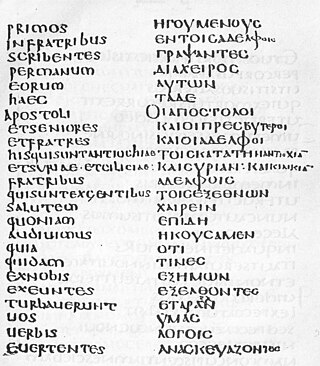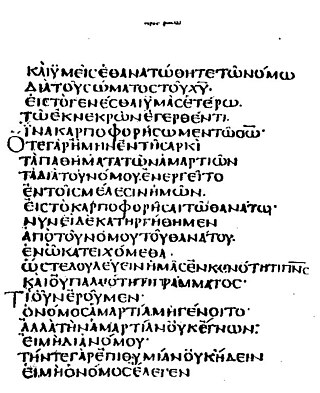
Acts 15 is the fifteenth chapter of the Acts of the Apostles in the New Testament of the Christian Bible. It records Paul and Barnabas traveling to Jerusalem to attend the Council of Jerusalem and the beginning of Paul's second missionary journey. The book containing this chapter is anonymous but early Christian tradition uniformly affirmed that Luke composed this book as well as the Gospel of Luke.
Romans 9 is the ninth chapter of the Epistle to the Romans in the New Testament of the Christian Bible. It is authored by Paul the Apostle, while he was in Corinth in the mid-50s AD, with the help of an amanuensis (secretary), Tertius, who adds his own greeting in Romans 16:22.

Galatians 2 is the second chapter of the Epistle to the Galatians in the New Testament of the Christian Bible. It is authored by Paul the Apostle for the churches in Galatia, written between 49 and 58 AD. This chapter contains the meeting account of Paul, Barnabas and Christians in Jerusalem, considered "one of the most momentous events in the earliest Christianity", and the dispute between Paul and Peter.

Romans 7 is the seventh chapter of the Epistle to the Romans in the New Testament of the Christian Bible. It is authored by Paul the Apostle, while he was in Corinth in the mid-50s AD, with the help of an amanuensis (secretary), Tertius, who adds his own greeting in Romans 16:22.

Romans 1 is the first chapter of the Epistle to the Romans in the New Testament of the Christian Bible. It is authored by Paul the Apostle, while he was in Corinth in the mid-50s AD, with the help of an amanuensis (secretary), Tertius, who adds his own greeting in Romans 16:22. Acts 20:3 records that Paul stayed in Greece, probably Corinth, for three months. The letter is addressed "to all in Rome who are loved by God and called to be saints".

Romans 3 is the third chapter of the Epistle to the Romans in the New Testament of the Christian Bible. It was composed by Paul the Apostle, while he was in Corinth in the mid-50s AD, with the help of an amanuensis (secretary), Tertius, who added his own greeting in Romans 16:22.

Romans 5 is the fifth chapter of the Epistle to the Romans in the New Testament of the Christian Bible. It is authored by Paul the Apostle, while he was in Corinth in the mid-50s AD, with the help of an amanuensis (secretary), Tertius, who adds his own greeting in Romans 16:22.

Romans 6 is the sixth chapter of the Epistle to the Romans in the New Testament of the Christian Bible. It is authored by Paul the Apostle, while he was in Corinth in the mid-50s AD, with the help of an amanuensis (secretary), Tertius, who adds his own greeting in Romans 16:22. In this chapter, it is shown that the Christian, in baptism, dies to sin.
Romans 8 is the eighth chapter of the Epistle to the Romans in the New Testament of the Christian Bible. It was authored by Paul the Apostle, while he was in Corinth in the mid-50s AD, with the help of an amanuensis (secretary), Tertius, who added his own greeting in Romans 16:22. Chapter 8 concerns "the Christian's spiritual life".
Romans 10 is the tenth chapter of the Epistle to the Romans in the New Testament of the Christian Bible. It is authored by Paul the Apostle, while he was in Corinth in the mid-50s AD, with the help of an amanuensis (secretary), Tertius, who adds his own greeting in Romans 16:22. Paul continues his discussion of Israel's rejection of God's purpose which he had commenced in chapter 9: despite his "anguish over Israel" it remains his "heart's desire and prayer to God for the Israelites that they may be saved".

Romans 11 is the eleventh chapter of the Epistle to the Romans in the New Testament of the Christian Bible. It is authored by Paul the Apostle, while he was in Corinth in the mid-50s AD, with the help of an amanuensis (secretary), Tertius, who adds his own greeting in Romans 16:22.

Romans 12 is the twelfth chapter of the Epistle to the Romans in the New Testament of the Christian Bible. It is authored by Paul the Apostle, while he was in Corinth in the mid-50s AD, with the help of an amanuensis (secretary), Tertius, who adds his own greeting in Romans 16:22.

2 Corinthians 7 is the seventh chapter of the Second Epistle to the Corinthians in the New Testament of the Christian Bible. It is authored by Paul the Apostle and Timothy in Macedonia in 55–56 CE.

2 Corinthians 11 is the eleventh chapter of the Second Epistle to the Corinthians in the New Testament of the Christian Bible. It is authored by Paul the Apostle and Timothy in Macedonia in 55–56 CE. According to theologian Heinrich August Wilhelm Meyer, chapters 10–13 "contain the third chief section of the Epistle, the apostle's polemic vindication of his apostolic dignity and efficiency, and then the conclusion".

Galatians 1 is the first chapter of the Epistle to the Galatians in the New Testament of the Christian Bible. It is authored by Paul the Apostle for the churches in Galatia, written between 49 and 58 AD. This chapter contains Paul's significant exposition concerning the significance of God's revelation of Jesus Christ.

Galatians 3 is the third chapter of the Epistle to the Galatians in the New Testament of the Christian Bible. It is authored by Paul the Apostle for the churches in Galatia, written between 49–58 CE. This chapter contains Paul's important argument about Abraham's faith and his 'offspring', a designation for "those belong to Jesus Christ".

1 Thessalonians 5 is the fifth chapter of the First Epistle to the Thessalonians in the New Testament of the Christian Bible. It is authored by Paul the Apostle, likely written in Corinth in about 50-51 CE for the church in Thessalonica. This chapter contains a message about Christ's second coming, and various final exhortations and greetings.

1 Timothy 1 is the first chapter of the First Epistle to Timothy in the New Testament of the Christian Bible. The author has been traditionally identified as Paul the Apostle since as early as AD 180, although most modern scholars consider the letter pseudepigraphical, perhaps written as late as the first half of the second century AD.

Philippians 1 is the first chapter of the Epistle to the Philippians in the New Testament of the Christian Bible. It is authored by Paul the Apostle about mid-50s to early 60s AD and addressed to the Christians in Philippi, written either in Rome or Ephesus. This chapter contains the greeting, thanksgiving, prayer and exhortation as an introduction (overture) to the major narratives in the next chapters.

Ezekiel 14 is the fourteenth chapter of the Book of Ezekiel in the Hebrew Bible or the Old Testament of the Christian Bible. This book contains the prophecies attributed to the prophet/priest Ezekiel, and is one of the Books of the Prophets. This chapter records a visit of some of the elders of Israel to Ezekiel, and God's response through the prophet dealing with the sins of idolatry.













